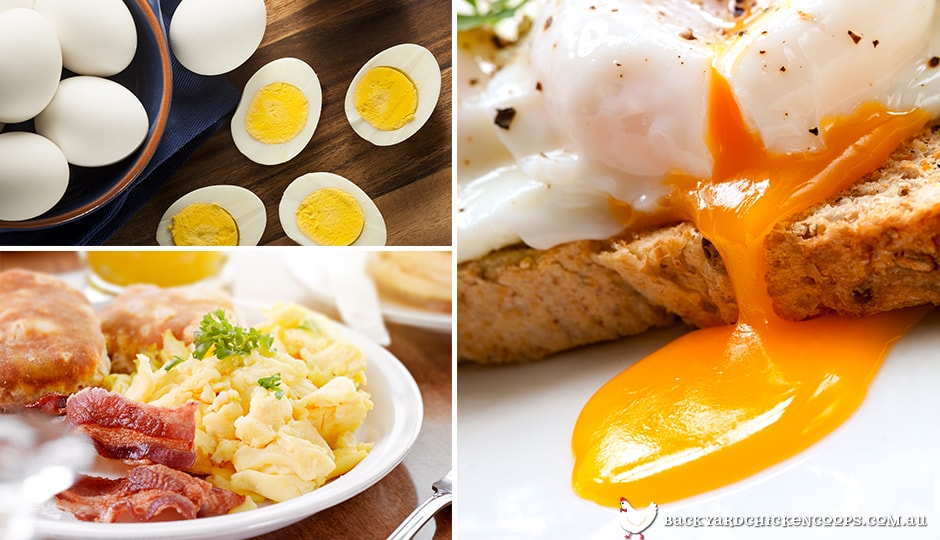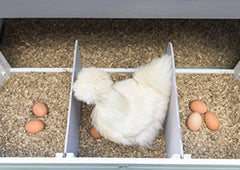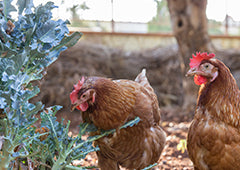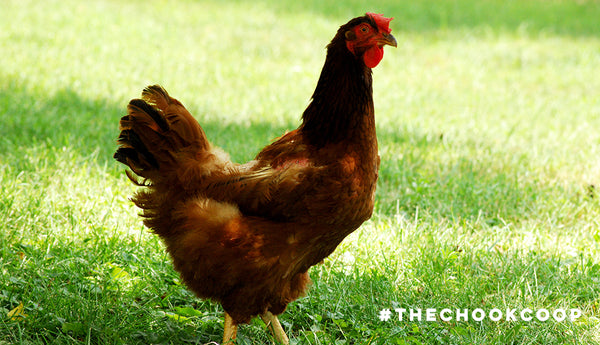Before people even decide to get chickens they often find themselves asking, “How long will the laying hens produce eggs for?” Though many of us keep chickens as pets first and foremost, at the end of the day it’s important for some chicken lovers to ensure they are getting plenty of eggs out of their flock. This article will give you an egg-cellent overview of the essential things you can do to ensure you get more eggs from your laying hens and they produce the best quality eggs for longer.
When do laying hens start to produce eggs?
Though some of us get rather antsy as we wait for our chickens to start producing eggs, it’s important to remember that baby chickens do so much growing so quickly. Generally speaking, you can expect to find your laying hens to start producing the goods around the time they are 20 to 24 weeks old. Some breeders are genetically modifying and strategically breeding poultry so that they start producing eggs by 16 weeks. But, like many of us, childhood is sacred, so perhaps it’s more ethical to allow the laying hens an extra four weeks of egg-free serenity.
What do chickens need to produce good quality eggs?
In order for your laying hens to produce healthy high quality eggs, all their basic requirements need to be in balance.
Superior nutrition:
It almost goes without saying that laying hens need a constant supply of food and quality chicken feed in order to produce the best quality eggs. A protein rich chicken feed, with adequate shell grit, will aid your laying hens as they cook up one delicious egg after the other for you. While chickens are laying, their diet should consist of 16-20 % protein, as well as having a complex combination of vitamins, minerals and calcium. Check the labelling of your favourite feed mix to ensure your laying hens are getting what they need.
Time with nature:
Chickens need time to free-range, scratch their claws and rustle their feathers, otherwise they become stressed, bored and destructive. A depressed, unfulfilled chicken will engage in self-destructive behaviours like feather picking, preying upon lowly members of their flock and throwing tantrums so wild they tip their chicken feeder over. Allowing your laying hens some time in the garden to hunt for bugs, have a dust bath and stretch their wings will put them in a better emotional place. Also, consider all the extra protein the laying hens will pick up from eating bug, beetles and insects all over your yard- yummy! Happier hens often results in healthier hens and healthy-happy hens tend to produce yummier eggs- you get me?
Peace and protection:
Without meaning to, some chicken carers over-stress their laying hens by frequently checking their nesting boxes for eggs- how would you feel if someone kept looking through your window as you were trying to go about your business?! Also, things like predators, pests, pets and children can cause your dedicated laying hens unnecessary stress, which can curtail egg production if it gets out of hand. Additionally, pecking order disputes that can arise when a new chicken is introduced may also stress your laying hens. If it is spring- peak laying season, maybe it’s best to delay any major changes to coop life for a less egg-productive time. Ensuring that your laying hens have spacious, comfortable and clean nesting boxes, like in The Penthouse, is one of the best ways to protect your chickens from predators, as well as promoting healthy and productive laying habits. At the end of the day it’s important to remember that laying an egg is a job that takes time, focus and some peace and quiet.
If you are able to consistently maintain this happy balance it is more likely that your laying hens will continue to produce eggs over a long period of time.
Which breeds of laying hens produce eggs for longer?
There are actually quite a number of things any chicken lover needs to consider when they begin to make the tough decision of which chicken breed or breeds they are going to care for. In the event that eggs are your first priority there are a range of purebred and crossbreed laying hens to choose from. Some chicken breeds that are perfect for laying hens include:
Isa Browns, Rhode Island Reds, Australorps, Leghorns, Plymouth Rocks, Sussex, Welsummer, Wyandotte

For more information about the wide variety of chicken breeds on offer check out this fantastic article here.
What to do with all those eggstra spring eggs?
Many chook lovers often eggs-perience egg-overload during the more productive months like spring and summer. Given that eggs do have a relatively short shelf life, people begin to feel nervy as their Egg Skelter, kitchen counter and fridge shelves rapidly start to fill up with crisp white, brown and blue eggs! Some people consider selling their eggs, however they encounter roadblocks as there is quite a bit of serious legislation surrounding the sale of eggs. One option is simply to give your eggstra eggs to your friends, family and neighbours. Alternatively you could consider a whole host of options, like hard boiling your eggs on mass for lunch boxes, making your own mayonnaise or you could even try and build the world’s largest meringue. Don’t just let your eggstra eggs rot- get creative!

At what times of the year will my chickens stop laying?
All chickens have what are called “biorhythms”. Biorhythms are essentially the cues your chickens take from nature to start laying, mating or moulting. Industrial sized laying operations intervene with nature’s natural biorhythms to encourage laying hens to produce more eggs for longer. As a result, chickens in these situations often become dependent on humans maintaining these artificial biorhythms, which unfortunately ends in an assortment of sad ways. Most chicken lovers who allow their laying hens to lead relatively free lives will see fluctuations in eggs production across different seasons as the biorhythms shift. For the most part, laying hens will stop producing in autumn when their feathers start to moult.
At what age should you expect your laying hens to stop producing eggs?
Some laying hens may happily keep producing eggs for 72 weeks, but this is also influenced by the seasons moult and their age at that time. Generally speaking, laying hens will gradually produce fewer eggs after 72 weeks. It isn’t common for chickens to immediately stop producing eggs overnight, however this does sometimes happen. Many clever poultry aficionados are able to work out a cycle of having eggs all year round by caring for a particular combination of breeds, whilst also wisely introducing new pullets at various points in the year.
Laying hens are incredibly gentle and generous creatures. Like a sweet yet simple human being, the only things laying hens truly require is a good diet, time with nature, peace and protection. So long as you are able to make your chickens feel loved and cared for you should be able to enjoy the benefits of their delicious eggs for longer.
The best and easiest way to ensure that your laying hens feel loved and protected is to purchase them a strong and sturdy coop, like the Taj Mahal, Penthouse or Mansion. The best omelettes start with healthy-happy chickens laying eggs in a warm, safe and secure coop.
Healthy hens produce healthy eggs! Therefore, it's essential that you've got the right knowledge you need to raise happy, healthy chooks. Did you know 67% of chicken keepers surveyed experienced a chicken health or behaviour issue in the first 12 months that they didn’t know how to handle?
But don’t worry! Our feathered friends over at Chickenpedia have created a Chicken Healthcare Course. It is a comprehensive online course that includes everything you need, including what to look for in an unhealthy chicken and how to support your egg-laying hens to optimal health. All of their courses are really well structured and filled with vital information, which is why I highly recommend them to all of my readers! From raising baby chicks to feeding to behavior, you’ll find valuable information that’ll give you the knowledge and confidence to successfully look after your chickens.
Check out Chickenpedia today. As a member, you will also get access to the ALL of their chicken courses!


















